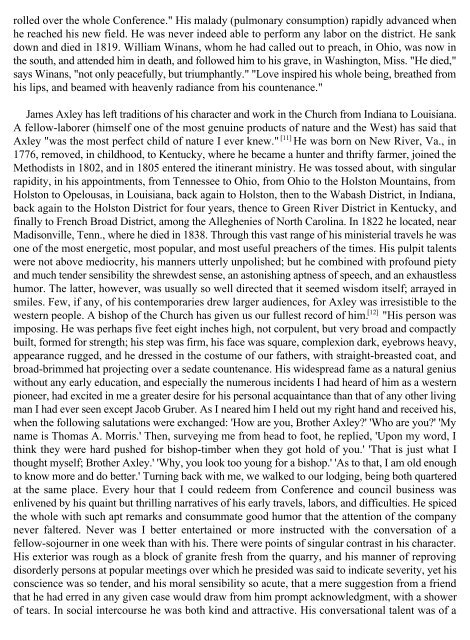History of the M.E. Church, Vol. IV - Media Sabda Org
History of the M.E. Church, Vol. IV - Media Sabda Org
History of the M.E. Church, Vol. IV - Media Sabda Org
Create successful ePaper yourself
Turn your PDF publications into a flip-book with our unique Google optimized e-Paper software.
olled over <strong>the</strong> whole Conference." His malady (pulmonary consumption) rapidly advanced when<br />
he reached his new field. He was never indeed able to perform any labor on <strong>the</strong> district. He sank<br />
down and died in 1819. William Winans, whom he had called out to preach, in Ohio, was now in<br />
<strong>the</strong> south, and attended him in death, and followed him to his grave, in Washington, Miss. "He died,"<br />
says Winans, "not only peacefully, but triumphantly." "Love inspired his whole being, brea<strong>the</strong>d from<br />
his lips, and beamed with heavenly radiance from his countenance."<br />
James Axley has left traditions <strong>of</strong> his character and work in <strong>the</strong> <strong>Church</strong> from Indiana to Louisiana.<br />
A fellow-laborer (himself one <strong>of</strong> <strong>the</strong> most genuine products <strong>of</strong> nature and <strong>the</strong> West) has said that<br />
[11]<br />
Axley "was <strong>the</strong> most perfect child <strong>of</strong> nature I ever knew." He was born on New River, Va., in<br />
1776, removed, in childhood, to Kentucky, where he became a hunter and thrifty farmer, joined <strong>the</strong><br />
Methodists in 1802, and in 1805 entered <strong>the</strong> itinerant ministry. He was tossed about, with singular<br />
rapidity, in his appointments, from Tennessee to Ohio, from Ohio to <strong>the</strong> Holston Mountains, from<br />
Holston to Opelousas, in Louisiana, back again to Holston, <strong>the</strong>n to <strong>the</strong> Wabash District, in Indiana,<br />
back again to <strong>the</strong> Holston District for four years, <strong>the</strong>nce to Green River District in Kentucky, and<br />
finally to French Broad District, among <strong>the</strong> Alleghenies <strong>of</strong> North Carolina. In 1822 he located, near<br />
Madisonville, Tenn., where he died in 1838. Through this vast range <strong>of</strong> his ministerial travels he was<br />
one <strong>of</strong> <strong>the</strong> most energetic, most popular, and most useful preachers <strong>of</strong> <strong>the</strong> times. His pulpit talents<br />
were not above mediocrity, his manners utterly unpolished; but he combined with pr<strong>of</strong>ound piety<br />
and much tender sensibility <strong>the</strong> shrewdest sense, an astonishing aptness <strong>of</strong> speech, and an exhaustless<br />
humor. The latter, however, was usually so well directed that it seemed wisdom itself; arrayed in<br />
smiles. Few, if any, <strong>of</strong> his contemporaries drew larger audiences, for Axley was irresistible to <strong>the</strong><br />
[12]<br />
western people. A bishop <strong>of</strong> <strong>the</strong> <strong>Church</strong> has given us our fullest record <strong>of</strong> him. "His person was<br />
imposing. He was perhaps five feet eight inches high, not corpulent, but very broad and compactly<br />
built, formed for strength; his step was firm, his face was square, complexion dark, eyebrows heavy,<br />
appearance rugged, and he dressed in <strong>the</strong> costume <strong>of</strong> our fa<strong>the</strong>rs, with straight-breasted coat, and<br />
broad-brimmed hat projecting over a sedate countenance. His widespread fame as a natural genius<br />
without any early education, and especially <strong>the</strong> numerous incidents I had heard <strong>of</strong> him as a western<br />
pioneer, had excited in me a greater desire for his personal acquaintance than that <strong>of</strong> any o<strong>the</strong>r living<br />
man I had ever seen except Jacob Gruber. As I neared him I held out my right hand and received his,<br />
when <strong>the</strong> following salutations were exchanged: 'How are you, Bro<strong>the</strong>r Axley?' 'Who are you?' 'My<br />
name is Thomas A. Morris.' Then, surveying me from head to foot, he replied, 'Upon my word, I<br />
think <strong>the</strong>y were hard pushed for bishop-timber when <strong>the</strong>y got hold <strong>of</strong> you.' 'That is just what I<br />
thought myself; Bro<strong>the</strong>r Axley.' 'Why, you look too young for a bishop.' 'As to that, I am old enough<br />
to know more and do better.' Turning back with me, we walked to our lodging, being both quartered<br />
at <strong>the</strong> same place. Every hour that I could redeem from Conference and council business was<br />
enlivened by his quaint but thrilling narratives <strong>of</strong> his early travels, labors, and difficulties. He spiced<br />
<strong>the</strong> whole with such apt remarks and consummate good humor that <strong>the</strong> attention <strong>of</strong> <strong>the</strong> company<br />
never faltered. Never was I better entertained or more instructed with <strong>the</strong> conversation <strong>of</strong> a<br />
fellow-sojourner in one week than with his. There were points <strong>of</strong> singular contrast in his character.<br />
His exterior was rough as a block <strong>of</strong> granite fresh from <strong>the</strong> quarry, and his manner <strong>of</strong> reproving<br />
disorderly persons at popular meetings over which he presided was said to indicate severity, yet his<br />
conscience was so tender, and his moral sensibility so acute, that a mere suggestion from a friend<br />
that he had erred in any given case would draw from him prompt acknowledgment, with a shower<br />
<strong>of</strong> tears. In social intercourse he was both kind and attractive. His conversational talent was <strong>of</strong> a
















